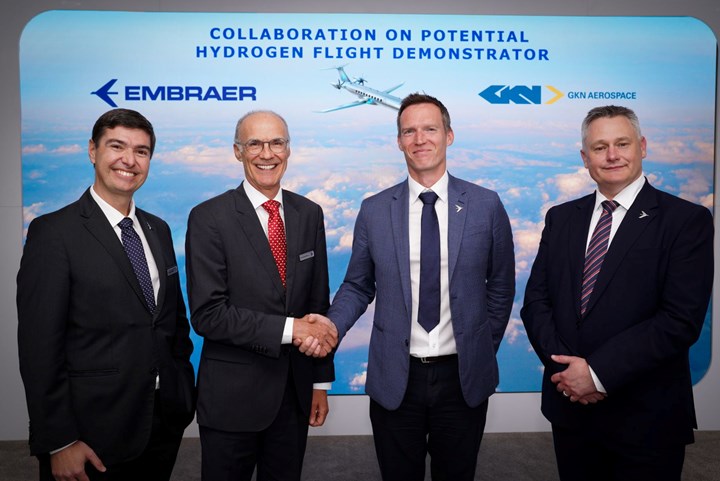Embraer, GKN collaborate on potential H2 flight demonstrator
Partnership agreement will focus on feasibility studies, hydrogen R&D programs and explore the potential development of a demonstrator, all to advance aerospace decarbonization efforts.
(Left to right): Embraer’s Daniel Moczydlower and Luis Carlos Affonso and GKN’s John Pritchard and Russ Dunn. Photo Credit: GKN Aerospace
Aerospace industry companies Embraer (São Paulo, Brazil) and GKN Aerospace (Redditch, U.K.) have announced a collaboration agreement on cutting-edge hydrogen technological development programs. The partnership aims to accelerate the implementation of hydrogen technologies in aviation, reducing emissions and paving the way for a more sustainable future. The collaboration will also explore the potential for a hydrogen flight demonstrator.
“The imperativeness of sustainability drives research and development program at Embraer, and the potential development of a hydrogen flight demonstrator represents an important milestone in our technology roadmap toward to the future of sustainable aviation,” emphasizes Luís Carlos Affonso, senior vice president, engineering and technological development at Embraer.
The agreement is part of Embraer’s commitment to the global efforts to collaborate with the air transport industry’s commitment to achieve net zero carbon by 2050. Together, both companies will leverage their extensive expertise and resources to actively support the development of innovative hydrogen fuel cell technology, as well as optimize airframe systems integration. GKN Aerospace is at the forefront of collaborative hydrogen programs across the Netherlands, Sweden and the U.K.
“We are proud to partner with Embraer and explore the next steps in the adoption of hydrogen technologies in aviation,” John Pritchard, president of civil airframe at GKN Aerospace, says. “By joining forces and harnessing the power of hydrogen technologies, we are not only reducing carbon emissions but also creating a new generation of clean air travel.”
GKN Aerospace’s flagship hydrogen exploration program, H2Gear, is focused on developing a highly efficient liquid hydrogen propulsion system specifically designed for subregional aircraft. With the potential for scalability to larger aircraft, this system converts liquid hydrogen into electricity within a state-of-the-art fuel cell system, thus enabling aircraft to operate with zero carbon emissions.
Related Content
-
Plant tour: Middle River Aerostructure Systems, Baltimore, Md., U.S.
The historic Martin Aircraft factory is advancing digitized automation for more sustainable production of composite aerostructures.
-
Cryo-compressed hydrogen, the best solution for storage and refueling stations?
Cryomotive’s CRYOGAS solution claims the highest storage density, lowest refueling cost and widest operating range without H2 losses while using one-fifth the carbon fiber required in compressed gas tanks.
-
Infinite Composites: Type V tanks for space, hydrogen, automotive and more
After a decade of proving its linerless, weight-saving composite tanks with NASA and more than 30 aerospace companies, this CryoSphere pioneer is scaling for growth in commercial space and sustainable transportation on Earth.

















